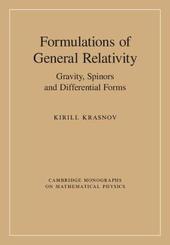
|
Formulations of General Relativity: Gravity, Spinors and Differential Forms
Hardback
Main Details
| Title |
Formulations of General Relativity: Gravity, Spinors and Differential Forms
|
| Authors and Contributors |
By (author) Kirill Krasnov
|
| Series | Cambridge Monographs on Mathematical Physics |
|---|
| Physical Properties |
| Format:Hardback | | Pages:404 | | Dimensions(mm): Height 173,Width 250 |
|
| Category/Genre | Cosmology and the universe
Relativity physics |
|---|
| ISBN/Barcode |
9781108481649
|
| Classifications | Dewey:530.11 |
|---|
| Audience | | Professional & Vocational | | Tertiary Education (US: College) | |
|---|
| Illustrations |
Worked examples or Exercises; 1 Tables, black and white; 2 Halftones, black and white; 3 Line drawings, black and white
|
|
Publishing Details |
| Publisher |
Cambridge University Press
|
| Imprint |
Cambridge University Press
|
| Publication Date |
26 November 2020 |
| Publication Country |
United Kingdom
|
Description
This monograph describes the different formulations of Einstein's General Theory of Relativity. Unlike traditional treatments, Cartan's geometry of fibre bundles and differential forms is placed at the forefront, and a detailed review of the relevant differential geometry is presented. Particular emphasis is given to general relativity in 4D space-time, in which the concepts of chirality and self-duality begin to play a key role. Associated chiral formulations are catalogued, and shown to lead to many practical simplifications. The book develops the chiral gravitational perturbation theory, in which the spinor formalism plays a central role. The book also presents in detail the twistor description of gravity, as well as its generalisation based on geometry of 3-forms in seven dimensions. Giving valuable insight into the very nature of gravity, this book joins our highly prestigious Cambridge Monographs in Mathematical Physics series. It will interest graduate students and researchers in the fields of theoretical physics and differential geometry.
Author Biography
Kirill Krasnov is Professor of Mathematical Physics at the University of Nottingham. Since receiving his Ph.D. from Pennsylvania State University, he has worked at the University of California, Santa Barbara, and the Max Planck Institute for Gravitational Physics in Potsdam.
Reviews'The work is mathematically rigorous and complete. Researchers working in fields such as quantum gravity will find this a very useful reference. Postgraduate students will also find it a helpful adjunct to the usual books on general relativity.' A. Spero, Choice
|